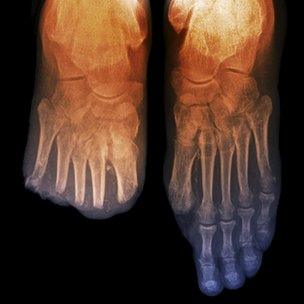Slow care leads to foot amputations
- Published

Thousands of diabetes patients end up having a foot amputation because of slow treatment, a charity warns.
Diabetes UK says that up to 80% of foot amputations could be avoided if better care was in place.
Patients are suffering because many areas do not have services in place to quickly deal with foot ulcers and infections.
By 2015, the number of diabetes-related amputations is expected to rise to 7,000 a year.
When diabetes, both Types 1 and Type 2, is present for many years, especially if it is poorly controlled, it can cause complications such as reducing blood flow to vessels in the feet and nerve damage which reduces sensation.
This increases the risk of ulcers and infections that may lead to amputation.
A report produced in collaboration with the Society for Chiropodists and Podiatrists and NHS Diabetes points out that people with diabetes are more than 20 times more likely to have an amputation than the rest of the population.
It recommends that all hospitals have a multi-disciplinary footcare team as recommended in national guidelines.
Figures suggest that 40% of hospitals currently do not have such teams in place.
Every hospital also needs to be able to guarantee that people with urgent foot problems can be assessed by the right professionals within 24 hours, the report urges.
This is because ulcers can deteriorate extremely quickly and a matter of hours can make the difference between keeping a foot and losing it.
Prevention
In addition people with diabetes who are at high risk for foot problems need to know what to look out for and what to do when a problem develops.
Barbara Young, chief executive of Diabetes UK, said it is unacceptable that every week people with diabetes who have treatable foot problems are having feet or toes amputated because they are not being treated quickly enough.
"It is not as if this is a problem we don't know how to solve.
"If every hospital had a multi-disciplinary footcare team and ensured access to that team within 24 hours, then that would make a huge difference to the amputation rates."
She added that some prevention work was so poor that people were not even asked to take their shoes off when attending their annual foot check.
"This is not something that requires more money," she continued.
"In fact, putting these kind of systems in place can actually save money because the amputations that they prevent are so expensive.
Matthew Fitzpatrick, spokesman for the College of Podiatry, said they strongly welcomed the recommendations.
"The most important aspect is that patients appreciate how to check themselves and are seeking appropriate advice when they need it.
"If they're worried then their local podiatrist should be the first port of call."
- Published31 July 2012
- Published25 April 2012
- Published7 March 2012